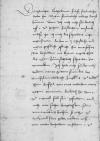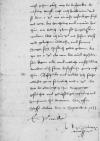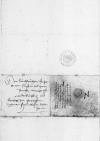List #5395
Ioannes DANTISCUS do Albrecht I von Hohenzollern-AnsbachLöbau (Lubawa), 1533-09-05
Rękopiśmienne podstawy źródłowe:
Pomocnicze podstawy źródłowe:
Publikacje:
| ||||||||||
Tekst + aparat krytyczny + komentarz Zwykły tekst Tekst + komentarz Tekst + aparat krytyczny
 GStA, PK, HBA, C 2, No 48, f. 2v
GStA, PK, HBA, C 2, No 48, f. 2v
Dem durchlauchten, hochgebornenn furstenn und hernn, / hern paper damaged⌈[hern]hern paper damaged⌉
 GStA, PK, HBA, C 2, No 48, f. 1r
GStA, PK, HBA, C 2, No 48, f. 1r
Durchlauchter, hochgeborner furst, freuntlicher, lieber her. Meÿnn freuntliche, willige dienst zcuvoran. /
Wann ich mich nicht sunderlich uff E(wer) Ir(barkei)t hochenn furstlichenn vorstandt vorlisz, / het ich mich dis schreibens nicht angenhomenn, / darzcw mich christliche / und meÿne geÿstliche pflicht thut vorursachen. / Bitt derhalbenn mit keÿner unguttigheit dis meÿnn zcuvorsichtlich schreiben zcwvormerckenn. / Ich habe nicht sunder mithleidenn / meines guttenn freundes, / des ernvhestenn  GStA, PK, HBA, C 2, No 48, f. 1v negst gehtann geboth, / was die dinstparkeit der rustung betrifft, / nicht noch zcwkomenn. / Und so dann E(wer) Ir(barkei)t wie ein recht vorstendiger furst wol weis, / das berichtung unnd antwurt zcwthun, / wie billich, / idrem sol zcwgelossenn werdenn, / bitt ich Eur Ir(barkei)t mit hohem vleisz, / wolt gedochtem
GStA, PK, HBA, C 2, No 48, f. 1v negst gehtann geboth, / was die dinstparkeit der rustung betrifft, / nicht noch zcwkomenn. / Und so dann E(wer) Ir(barkei)t wie ein recht vorstendiger furst wol weis, / das berichtung unnd antwurt zcwthun, / wie billich, / idrem sol zcwgelossenn werdenn, / bitt ich Eur Ir(barkei)t mit hohem vleisz, / wolt gedochtem
Dat(um) uffm slosse
E(wer) Ir(barkei)t willig(er)


